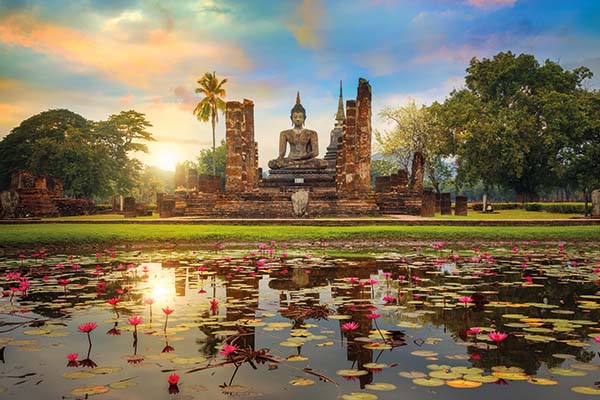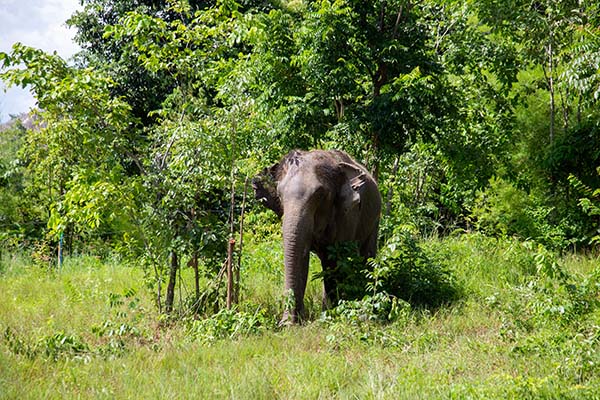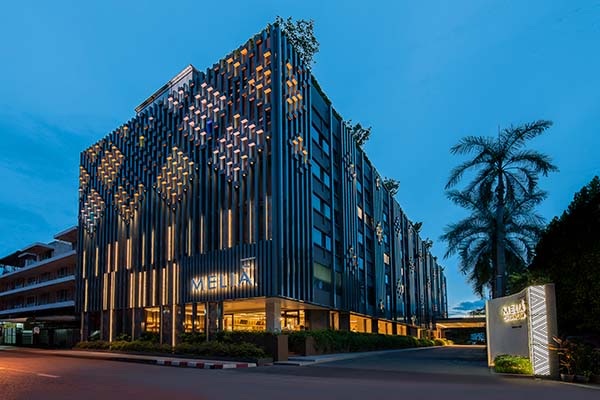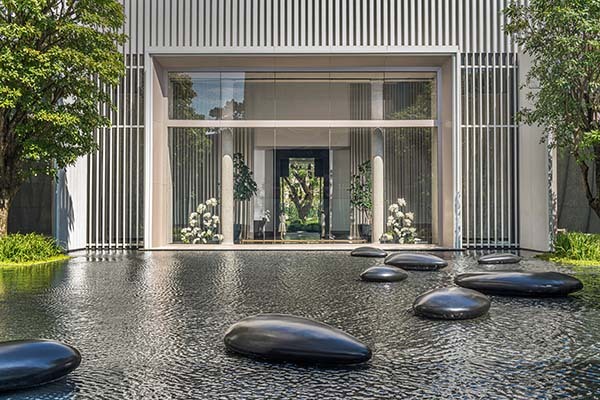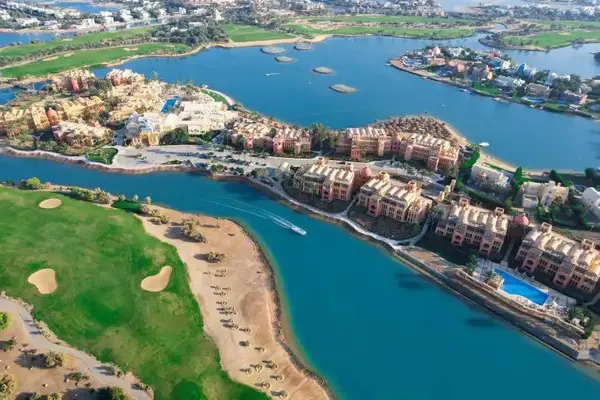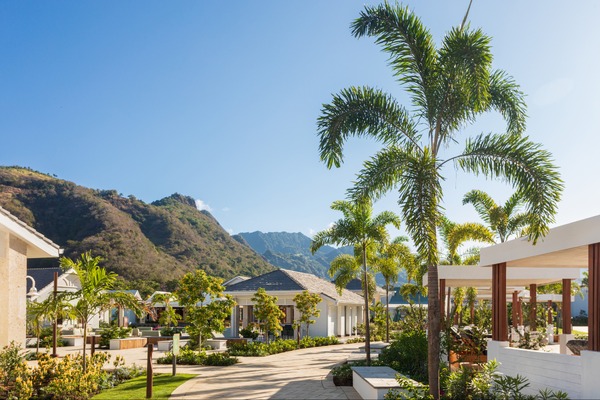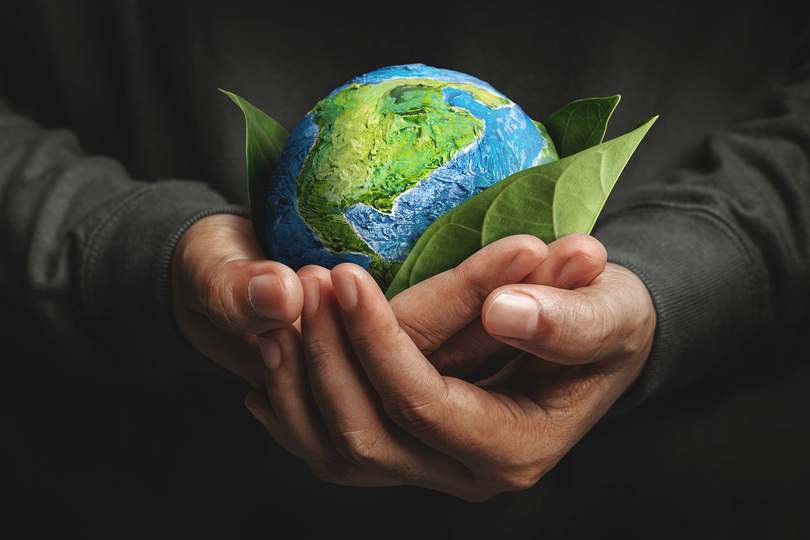Why it's the perfect time to take a tri-centre trip to Thailand
Now Thailand is well and truly open again, the time is right to discover nature and cultural immersions on a soul-soothing, tri-centre trip to the country.

At Elephant Hills Bush Camp’s lunch buffet my new friend Maebub surveys the selection – chopped pineapple, bananas, tamarind or grass – and opts for sweet pineapple. Next she wraps her trunk around the elephant grass, grabs the bananas and sniffs the tamarind. She can clearly smell the unpalatable bitterness of the healthy fruit I’ve rolled in salt and wrapped inside banana leaves, but gulps it down anyway.
With a pierced ear where a tag once was, Maebub is a former logger and has no “finger” at the end of her trunk, but has incredible dexterity all the same. After lunch, I watch her happily smothering herself in mud and brush to ward off sand flies and sun. I’m relieved she’s in the safe hands of her kindly mahout, or keeper, with her eight buddies roaming some 40 acres of the new bush camp in Thailand’s north-eastern Hot province.
The camp insists it does not rescue the elephants as such; instead they have to buy them out of industries such as logging, and after meeting Maebub I feel sure at least one soul has been bought into a better life via this mission.
The safari-style lodge appears as much a luxury glamping resort for guests as it is for the elephants, with mutually enriching activities, including the meal I’ve just made and fed to the gentle giants. My lunch buffet at the clubhouse overlooking the Ping river is no less impressive, with a great choice of Thai curries and pasta. The mahouts are from the Karen community who live onsite, offering the chance for visitors to learn about their traditional lifestyle too. With their help, we cooked up a delicious curry under a thatched village roof, and learned clever techniques for preparing coconuts and separating wild rice.
Mind body and soul
I’d reached the Bush Camp via a smooth two-hour drive from the northern gateway of Chiang Mai. According to my guide, Kathy, the “city of 1,000 temples” shares similarities with the Indonesian island of Bali in that it has its own culture and religious rituals separate from the capital. It’s also a city where creative expression has found its way beyond the intricate stone and golden temples into local art and cuisine.
Booking weeks ahead had secured us a chef’s table tasting menu at Michelin-listed Blackitch. The minimalist back-street eatery has both style and substance, with chef Phanuphol Bulsuwan – AKA Chef Black – putting a modern spin on local dishes including green tiger prawn and squid sushi.
My stomach satisfied, the next stop was the world-class contemporary art gallery MAIIAM, which provided food for thought before indulging in hour-long traditional Thai massages by the pros at the pleasant sanctuary-like space of Makkha Spa.
From my smart hotel room at the Melia Chiang Mai, which opened in the spring of 2022, I could see the huge canopy of the city’s famous Night Market sheltering its colourful wares. High in the encircling hills the golden mountain temple of Wat Phra That Doi Suthep glinted in the sun.
A helter-skelter drive through teak and rosewood forests took us to the funicular that lifted us the final few feet above the clouds to the temple plateau. The red-and-gold stupas (mound-like temples) and buddhas are almost as dazzling as the view over Chiang Mai at a dizzying three miles up.
We credited the traditional Buddhist water blessing – where a monk said a prayer, doused us with water and sealed it with a rope knotted around my wrist – with protecting us from the downpours that seemed to always hit when we were en route to our next destination.
In the lower reaches of the forest, a trip deep inside the meditation tunnels of 13th-century Wat Umong offered a stark contrast to the mountain-top temple. Silent candle-lit passageways lead off to time-worn shrines and the faint outlines of paintings of birds and lotus flowers from hundreds of years ago offer a ghostly portal into the past.
Floating around
Amid the bustle of Bangkok, it can be easier to find your bearings beside the snaking Chao Phraya river, which guide Kathy describes as a lifeline for the city. Luxury riverside retreats such as the Mandarin Oriental, Shangri-La, and the new Four Seasons Chao Phraya – where I stayed – have their own private water taxis to ferry guests between key locations to help avoid the often traffic-laden streets.
Four Seasons Chao Phraya is an airy “urban resort” that has secured a prime spot for itself with river-view rooms and chic eateries tucked into the ground floor. Tiered water gardens of smooth black stone and glass give it a zen aesthetic not unbefitting the emerging theme of my trip. Its speakeasy bar-style Social Club served up the best artisan cocktails and snacks I tasted in Thailand. There was barely need to tackle that notorious traffic, with the Four Seasons’ water limousine spiriting us along to Tha Tien Pier and Above Riva for dinner on a riverside roof terrace, or for a spot of retail therapy across the river at the impressive Icon shopping centre. But there are some places it’s helpful to have a car to get to – such as Ayutthaya.
Hitting the road at 11am, we avoided rush hour and reached the city in around an hour. As the ancient capital dating from 1350 onwards, it sits at the root of Thai tradition and culture. A distinctive local Frog tuk-tuk took me around the old city temples, with the driver commenting that we were some of the first foreign tourists he’d seen in more than two years. With Thailand having relaxed all Covid restrictions this summer, that’s likely to change this winter.
Now in ruins, the old palace and its subsiding stupas make up the heart of Ayutthaya’s old city. Though a tourist attraction, the complex has a surprisingly serene vibe. With the tinkling of percussive music from the modern temple alongside, I roamed the stairs and walls to find the chunky roots of a sacred bodhi tree wrapped around a stone buddha head like a boa constrictor. The archaeological site is also a sanctuary for local animals – a black and white dog draped across the entrance to a high stupa watched striped squirrels dart about, while electric blue swifts took off into the sky and a monitor lizard rested by the lake.
It’s worth working up an appetite in the old city to enjoy the best of its new cuisine at modern Michelin-listed eatery Baan Pomphet by the river. Here, the food is fairly traditional but finely cooked – Thai native Bee says people come from Bangkok just to tuck into the king prawns here, which are the biggest I’ve ever seen.
Later, a relaxing cruise along Ayutthaya’s River Noi onboard a plush converted rice barge revealed a landscape little changed by time. Temples and wooden houses on stilts rise along jungle-entangled banks, and we waved to local fisherman as flocks of storks took off into the sunset. We docked to an enchanting scene at the renovated rice mill Suryan Chandra restaurant; with huge wooden cogs still visible and barrels frothing with dry ice, a Thai banquet was served under rafters festooned in purple and pink lanterns and flowers.
Eat pray love
Back in Bangkok, I indulged in authentic Chinese fare at the Michelin-starred Four Seasons Yu Ting Yuan restaurant and also took off on a walking tour of the nearby Creative District. Part of the old town once filled with mechanic’s workshops and antiques dealers, it’s been transformed over the last few years to become Bangkok’s hipster quarter. Street art now adorns the alleyways, and cute cafes and arty stores such as Citizen T sit inside old-style opium dens and traditional tumble-down Thai houses.
Next morning, after a meditation session with resident monk Pra Maha Nopparatat at Bangkok’s Wat Pho, I practise my new-found walking meditation technique pacing the length of the famous gold reclining buddha. Though it’s not very monk-like to be cocooned in luxury at the Four Seasons, it does feel fitting to be ending a very zen trip in the company of yet another gentle giant.
How to book it
If Only offers a 14-night Ethical Elephant and Beach Experience in Thailand with two nights at Four Seasons Chao Phraya in Bangkok; three nights in Chiang Mai; two days and one night at Elephant Hills Bush Camp; and eight nights at Ritz-Carlton Koh Samui from £9,069pp including flights and transfers, based on 5 June 2023 departures, ifonly.net
Don't miss out!
Tickets are selling fast for the prestigious TTG Luxury Travel Awards on Friday 24 February – the first major luxury travel event of the year!
